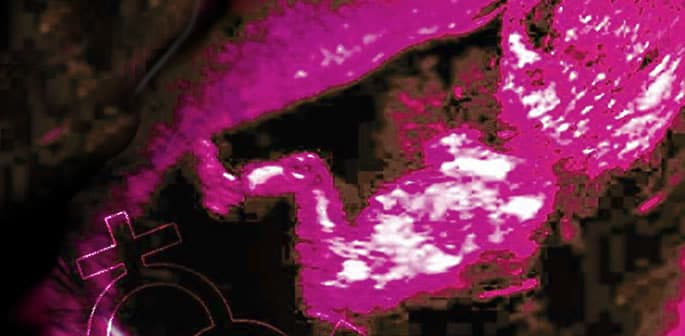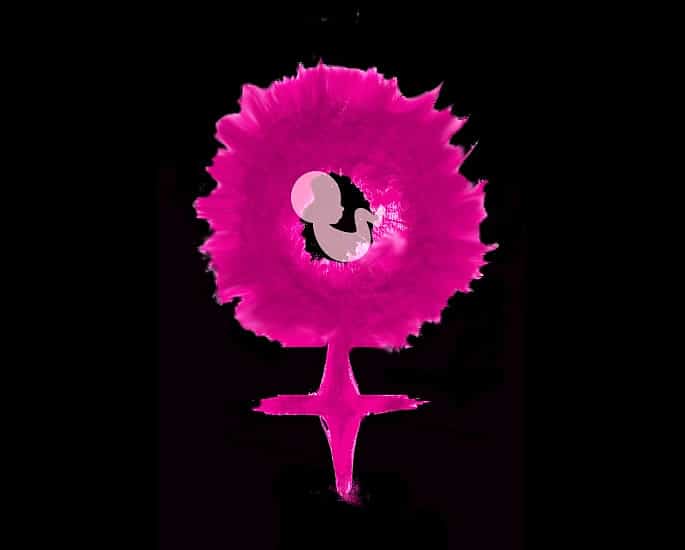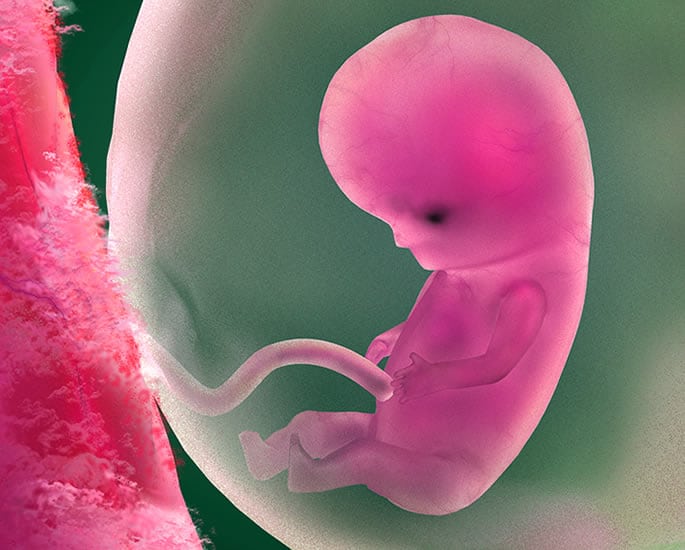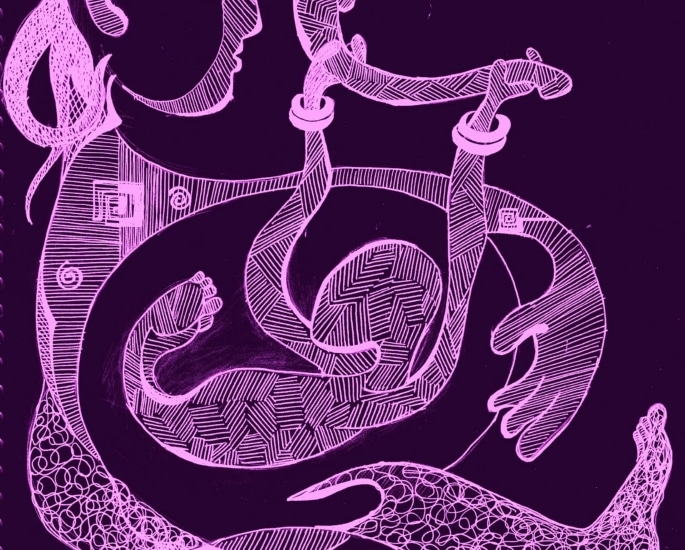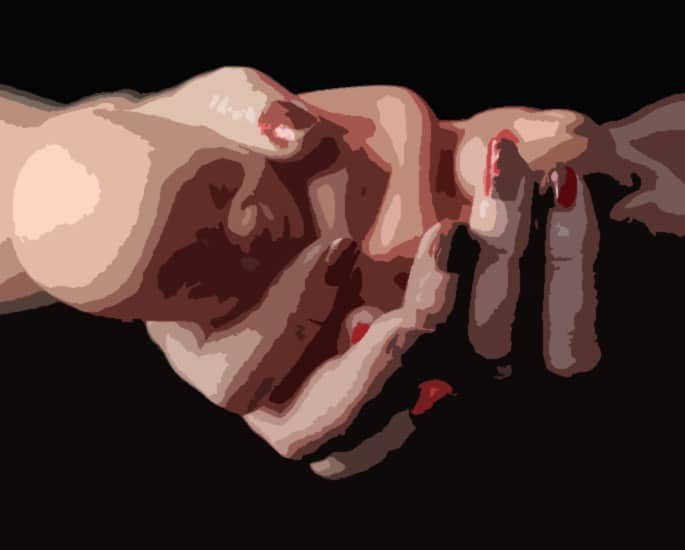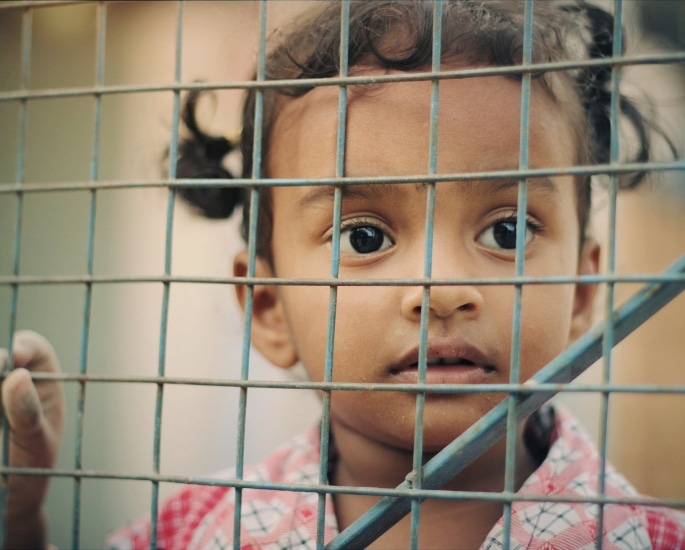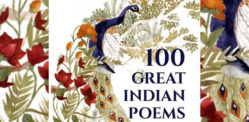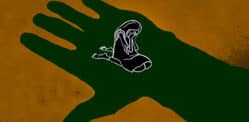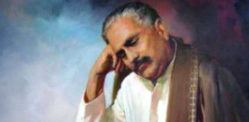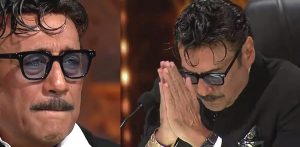"Female foeticide is still rampant in lands remote"
Desi poems about female foeticide and infanticide reveal the heartache, pain, and demographic consequences of these phenomena.
Female foeticide and infanticide are serious social issues present affecting Indian people and society. They stem from old, narrow traditional beliefs that girls do not provide enough value to a family.
Foeticide is an illegal abortion of a female foetus. Female infanticide is the deliberate killing of a child up to the age of one year. Both foeticide and infanticide are considered as gendercide.
Mothers often cannot express their feelings because of the pressures and expectations of their families and society.
Many desi poems compassionately spread awareness about these issues that should not be ignored.
Writers are understanding about the vulnerable position of these pressurised women. They stand on the side of the mothers, making them feel less alone.
Many poets acknowledge the feelings that mothers feel deeply, such as grief, loss, sadness and anger.
The authors also point out the blessings that female children bring to this world. They express hope to change people’s minds about taking away innocent lives.
Let’s take a closer look at some Indian poems that explore the feelings, causes and effects of gendercide.
Determined for Sex by Suresh M Iyer
Men worship women
Great culture that we are
Man to woman
Love for lust
Marry for money
Determined for sex
*********** before marriage
Sonography after marriage
Choice is a boy
Result – sex determination
Girl ends up as foetus
Boy ends up as a man
To find a day where
Men wont get women
Homos will rule
***** to sono to homo
The cycle might end here
Won’t be seen at home ever
Women to be seen only in temples
Men will worship women indeed
Suresh M Iyer is an Indian CBI (Central Bureau of Investigation) crime assistant, writer and a blogger. He was born in 1974 in Dombivli, India.
Since 2007, he has written poetry, articles about social issues, and over 40 short stories. He won the best blog at Indusladies in 2010. You can find his work here.
In 2009, he won at the Short Story Contest by Writers Guild of India, a non-profit association supporting writers. He won with the entries Rocket Raja (2011) and Hidden Love.
With his poem Determined for Sex, Iyer frankly reminds the audience about the causes of female foeticide and infanticide and the impact of them.
In the poem, Iyer points out the hypocrisy that women only receiving appreciation when they fulfil the needs of men.
Women are worshipped for sex, lust and love. They are respected as long as they are not pregnant with a girl.
After marriage, it all goes sour, and wives are under control and possession of a man. Women lose basic human respect and the option of choosing to keep their female babies.
What is worse, some women do not even earn respect to stay alive.
For that reason, Suresh reminds people in his poem that women should be appreciated more because they deserve to live.
“Choice is a boy” implies that the only purpose of a woman is to bring a boy to the world.
The PCPNDT Act 1994 (Preconception and Prenatal Diagnostic Techniques Act) prohibits disclosure of the sex of the foetus and sex selection.
According to a UNICEF report titled Female foeticide in India (2006), the PCPNDT Act has been amended in 2003 by the Mumbai High Court.
“The Court pronounced that prenatal sex determination would be as good as female foeticide. Pre-conception sex determination violated a woman’s right to live and was against the Constitution, it said.”
Moreover, the act forbids the selling of unregistered ultrasound machines and other equipment for revealing of sex to people, clinics and laboratories.
However, the ultrasonography remains to be easily accessible, and the price of ultrasound and abortion in India is around $150 (£117).
Furthermore, evolved technology only spurs the foeticides forward. There are mobile sex selection clinics available even in remote villages and neighbourhoods.
Iyer warns the audience that if sex-selective abortion keeps up, one-day women will be extinct. If that happens, human species will not survive.
One of the issues that foeticide creates is very disproportionate sex ratios. The UNICEF report Female foeticide in India (2016) by Alka Gupta reports a decline in female children.
According to the 1991 census, there were 947 girls in comparison to 1000 baby boys. In 2001, the number of girls declined to 927, whilst the boys remained the same.
As per the UNICEF report, experts say that sex-selective abortions heighten sexual violence, child marriages and trafficking.
Without women there will be no life and the world would be empty. Therefore, in the poem, Suresh sends a powerful message that female foeticide should stop to keep women alive.
The Last Letter by Varsha Bhardwaj Gaur
Dear daughter,
I never had longed to be alone,
I never had wished you to be alone.
But see how things ensued –
That you were forever alone…
You were my part – for three months –
Those pleasing three months,
Those crucial three months,
Those grueling three months,
That transformed both of our lives.
So…you were my part for three months,
When they split us apart…without letting me realize.
I avow – my child – I was unfamiliar.
And I too turn into a slayer.
How could I then – Dwell with those scoundrels?
I did – why? SOCIETY…
I had a son two years later,
A delight had they felt, and,
I died that day of ignominy.
And I wrote you every year
On the expected date of your birth.
Alas! I didn’t have an address…
Yet I wrote!
Although I could not see you grow,
But I buy a dress each year
Just for you – that to see,
How you might be budding somewhere.
Although I could not see you toddle,
But I had bought anklets for you
Just to see how those jingle,
When you would have danced.
Although I could not hear you chatter,
But I could see you – hop in my dreams – and-
Murmur gently in my ears, “Mummy…”
And I rouse out of the blue
Just to find – one murderer of you –
Slumbering by my side –
Anger maddens me,
Revenge tries to speak up,
But I keep shut for the son –
For whom you were eradicated.
It’s been twenty and five years,
And with all departing days,
Ire soared far above the ground.
If you were living,
You would have been my friend –
My adviser and motivation
So – I tell you –
This is the last letter I inscribe to you.
I can no more live with guilt –
Guilt of breathing with killers,
Guilt of letting them exist freely.
And the son – for whom –
My dear child, they took your life –
Stays neither with me nor with them,
He has his own life and a wife.
I loathe now everything in this world.
I have no affections, no adoration.
Yet I love you until the end of time
And I missed you for eternity …
I don’t know where will I go,
Will I continue or I end,
But one thing in no doubt –
I would be away from humiliation.
And since I had not let you see this life,
My child – I tell you – life is beautiful –
Close your eyes and whisper in my ears –
“Mummy” – and all world will be yours.
Nothing more can I write,
Except to say –
If you could – forgive me –
Your loving mother…
Varsha Bhardwaj Gaur is an Indian writer and a blogger. She lives in Greater Noida, India with her husband and daughter. You can find her blog here.
A former dental surgeon, she found her calling in writing.
The self-published author released a novella called An Unrealistic Love Story (2016).
In addition, she has published short story collections, which include Waves: A Collection of Short Stories (2015) and Nest An Abode of Short Stories (2017).
Fond Illusion (2017) is an e-book collection of her blog posts.
The poem The Last Letter gives a peek into a mother’s grieving heart wrecked by foeticide. After losing her daughter, her life is never the same.
The poem candidly reveals the feelings that mothers have after aborting their unborn daughters.
Even though the mother has been pressured to abort, the guilt is eating her up inside. The guilt is visible in the verse, “And I too turn into a slayer.”
Furthermore, she carries a burden of sleeping with her husband whom she sees as a murderer.
Two years after female foeticide, she does have a son. But she clearly cannot get over her daughter.
She keeps buying her unborn daughter a dress every year on the day that she lost her. The memory of the unborn daughter will never fade.
Through this poem, mothers can hopefully find solace for their wounds. The poem realistically shows the range of feelings that mothers feel after losing their daughters.
The grief, guilt and endless love for the unborn daughter haunt them every day.
Also, depression drags them down, making them feel hopeless.
In the end, the narrator announces that she will stop living in guilt. She reaches an epiphany and realises that this was not her fault.
Gaur encourages other women to speak up about the injustice done to them as she writes:
“I can no more live with guilt – Guilt of breathing with killers, Guilt of letting them exist freely.”
Varsha reminds the audience to think twice before committing foeticide because it has lifelong effects on mothers. It ruins the lives of these women on unimaginable levels.
Queens and Corpses by Jaspreet Kaur
It says from her, ‘kings are born,’ she is a creator,
It is through her that life evolves.
She is our caretaker.
Yet thousands of little girls were never given such a worth,
They have been cut to pieces, abandoned, at their very birth…
Before she sees the world around,
Buried alive, kicking. Screaming, in the ground.
Before she has taken her very first step,
Before she could breathe her very first breath…
Drugged with opium, strangled, some thrown in the flame,
Some stuffed with their own faeces,
Her female body and female mind are all there is to blame…
Dowry. “Why burden ourselves?”
We shall have sons, upon sons, upon sons.
Our name will last forever.
He shall look after us, all of us, all of us together.
He can take our land, inherit, and all shall be divine.
And those corpses of the baby girls will disappear with time.
Underneath that land that they hold so dear,
Are thousands of infant girls with no voice left to hear…
Ratios, censuses, statistics.
They are clearly showing one thing.
Where are the missing daughters?
What shall these generations bring?
Female infanticide. A topic left for whispers.
We cannot just blame the men. It is the mothers, wives and sisters.
‘To a woman a man is bound. So why call her bad? From her, kings are born. From a woman, woman is born; without woman there would be no one at all’
Our bani cries these words to us. So why do we treat daughters as if they are worthless.
I can stand here with my kesh down my back and my kara on my hand because my father and my mother said I am same as my brothers.
But where are all those missing daughters of Panjab?
The lost daughters of Panjab.
60 million. 60 million missing girls of India. That is almost the population of our land here.
Does that not create any fear?
Fear of an unbalanced gender-ratio, resulting in a hyper masculine Indian society. More extortion, distortion, more disproportion.
More rape, more kidnapping, more sex-selective abortions.
There is only one way that this can end. The only way for it to stop.
We must change our views on women. The paradigm must drop.
Drop into the sea of blood that this paradigm has caused.
Continue on with equality from the place that it has paused.
Please remember females are not a burden, an object. Females are not a cost.
Else blood will stain the lands of Panjab with daughters they have lost.
Jaspreet Kaur is a British Indian spoken word poet based in East London. She is active on Instagram, Twitter, Tumblr and YouTube.
She is a secondary school teacher of History and Sociology. In her poetry, Kaur tackles issues pertaining to Asian society and gender issues.
The young author has won many awards, including at the 2017 Asian Women of Achievement Awards under the arts and culture category.
In Queens and Corpses, Kaur refers to female infanticide in Punjab. It is also the first poem that she has performed.
The poem was inspired by her MA about 60 million missing girls of India or the lost daughters of Punjab.
The reasons for so many missing women are sex-selective abortions and the discrimination of girls. In India, boys get better nutrition, medical care and education than girls.
According to the UNICEF report Female foeticide in India (2016), since 1991, 80% of Indian districts revealed a drop in the birth of female babies. The state of Punjab has the worst decline.
The poems allude to this as Kaur writes:
“Ratios, censuses, statistics. They are clearly showing one thing.”
A United Nations report titled, Female Infanticide Worldwide: The case for action by the UN Human Rights Council (2016) reveals that India has the highest number of female foeticide in the world.
The report suggests that female children from 0 to 6 years old dropped from 78.83 million in 2001 to 75 million in 2011.
Jaspreet visited Unique Girls Home in Jalandhar during her trip to Panjab.
Reflecting her thoughts, she states:
“Many of you have read/heard my piece Queens & Corpses, and sadly, this is the reality of ongoing son preference in South Asian culture that the poem was trying to emphasise.”
“Without a change at grassroot levels and from the top, it’s implications will continue to result in skewed sex ratios, female feticide and higher child mortality and abandonment rates for girls.”
The paradox of Indian society is apparent in this piece. Women are worshipped and called queens as long as they carry sons in their wombs.
At the same time, females are downgraded. Sometimes they do not even get born because of the hate towards their gender.
In Queens and Corpses, Kaur reveals the ways in which the horrible crime of female infanticide is executed:
“Drugged with opium, strangled, some thrown in the flame, Some stuffed with their own faeces.”
The birth of a son is followed by celebration, whilst bringing a girl into the world is frowned upon.
In Indian culture, girls are seen as a waste of dowry because they do not guarantee to give anything back. Dowry is a sum of money or valuable goods that a groom gets from the bride’s family.
On the other hand, sons are thought to be reliable. They will later take care of their parents, and make more children.
Towards the end of the poem, Jaspreet suggests that the change begins in our minds. She refers to the paradigm shifts about established beliefs about female children and women in general.
The UNICEF report Female foeticide in India (2016) proposes that a solution to the problem is to educate women. They should also be granted more chances to be independent and given property and land rights.
The report optimistically reveals that states in the Northern East and around Kerala have given women such rights. As a result, they have a more stable sex ratio in those parts of India.
Jaspreet reminds everyone that female children are not a burden. There is no price for human life. Hence, female foeticide and infanticide should stop.
Female Foeticide by Priya Verma
Oh, people of the world
Let us blossom
Don’t kill us in womb
We want to see
the beautiful world
Females are the
Wealth of Nation
Girls are as good as boys
Don’t kill us
Female foeticide is
A crime against women
Think it over
It should be banned
at all cost
No abortions
No female foeticide in future
To save the beautiful
Creation of God
Oh, people of the world
awake now
otherwise
you will add one more
in the list of
endangered species.
Priya Verma is an Indian Canadian innovator, environmentalist, and writer. She has written over 1000 articles about youth, women and environmental issues to spread awareness about these topics.
She writes for World Pulse, British Council, the UN, Commonwealth and UNICEF publications.
Verma wrote the poem Female Foeticide when she was still a school child. The poem was published in several newspapers and magazines.
The poem is about how people of all genders are blossoming in the world. Thus, foeticide should be stopped.
Female Foeticide raises awareness about the severity of the issue. Priya sends a message to rethink the cruel action of foeticide before it happens.
The consequences of cruelty are never positive. She concludes that eventually, females could be extinct if foeticide keeps being practised.
The UNICEF report Female foeticide in India (2016) highlights this concern stating:
“The girls have not vanished overnight.”
“Decades of sex determination tests and female foeticide that has acquired genocide proportions are finally catching up with states in India.”
The root problem and the cause of foeticide is an unfair belief that female babies do not deserve to live.
Priya reminds us of the beauty that women bring into this world. She points out that female babies are as worthy as male children.
Therefore, it is a huge loss for humanity if babies are killed in the mother’s wombs.
A reader on the World Pulse forum where the poem was published, commented:
“The poem was extremely moving. It very directly states the evils of gender-based violence and calls for immediate action, all the while capturing one’s emotions.”
Evil Chromosomes by Sara Chansarkar
Pained and shamed, parents looked at her
An enormous burden, not their lovely daughter
Her brothers were fed milk and cream
She tasted them daily, but in her dreams
Boys were sent to school with uniforms and books
She stayed back, scrubbing and cleaning dirty nooks
Still a child, they hastily arranged her marriage
Too anxious to relieve themselves of the baggage
She weaved her new life with patience
Head hung low always in obedience
Soon she learned she was pregnant
‘Baby’ the word felt warm and fragrant
Dreams of the baby filled her nights
Already hugging it in her arms tight
Showered with unprecedented care and love
She couldn’t thank enough the heavens above
They took her to the clinic that ominous day
“It’s a girl”, she heard the doctor shamefully say
An acrid potion was forced brutally down her throat
Female foeticide is still rampant in lands remote
Indian born Sara Siddiqui Chansarkar lives in Columbus, Ohio, USA. Chansarkar holds an MBA and works as an IT lead.
Her writings have been published in a number of magazines including Ms Magazine blog, The Aerogram, and Columbus Moms Blog. Her blog This I Believe has been on top of Indian blog lists.
On the blog Sara’s Punny Fingers you can read her fiction, non-fiction and poetry.
The poem Evil Chromosomes by Sara has been published in the Brown Girl Magazine. The author has written the poem for Brian Davey’s contest ‘Evil is Everywhere.’
The poem tells a tragic story common in the rural parts of South Asia where people strictly follow gender-role traditions. Little girls are unwanted by their families since their birth.
Some of them do not even experience the beauty of life due to female foeticide. They are considered to be a burden on the family and are killed right away.
The young girls grow up believing that they are worthless because a male child is traditionally preferred. A boy will prolong the lineage, whilst a girl does not have any important social role as per their thinking.
These families often treat a female child as unwanted baggage. They strive to marry them off as soon as possible, which costs money too. These reasons motivate people to get rid of their daughters through female foeticide.
The girl in Evil Chromosomes is denied education, while her brothers are encouraged to attend school.
“Her brothers were fed milk and cream,” implies that boys are treated better. Meanwhile, girls can only fantasise about such luxuries in such parts of the world.
When girls are pregnant with a female child, they are forced to abort it because raising it is too demanding.
The poem points to the fact that foeticide is often performed in cruel and illegal ways as Chansarkar describes:
“An acrid potion was forced brutally down her throat.”
The woman in Evil Chromosomes feels deep shame and fear for bringing the female set of chromosomes to the world.
A fan of Sara’s piece commented on the poem on the website Poetry Soup:
“Sara you have addressed an issue so cruel.”
“It’s really sad that people still think girl child is a liability. Your poem is a very nice effort of awareness.
“I think some very strict laws should be passed & practised to condemn it totally. Congratulations on your win with this powerful writing.”
The only way to solve the issues of female foeticide and infanticide is to talk about it openly. And poetry can serve as a means of opening up and spreading awareness about these two important issues.
Many of the poets highlight the emotional and mental consequences for mothers. Through their verses, they can offer them understanding and empathy, along with a shoulder to cry on.
Many poems promote the urgency to resolve the issues of foeticide and infanticide.
People should be educated about the issues and women should be offered more rights to eradicate these social menaces.
Hopefully, these Indian poems will help change such gender bias and offer some solace to grieving mothers in India and around the world.




















































